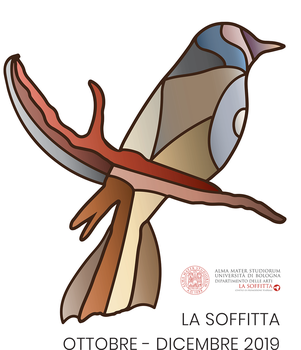
As of the new 2019 Season, the traditional sections of La Soffitta Theatre Centre – film studies, dance, music, theatre – will welcome two additional categories: Visual Arts and History and Society. This significant change highlights how peculiar our Centre is: La Soffitta is, in fact, an institution closely linked to the Departments of the Arts, hence reflecting and reinterpreting the Department’s contents and transformations. The Department of the Arts was born in 2012, when the Department of Visual Arts and the Department of Music and Performing Arts (which La Soffitta was already part of) came together. In 2018, this new Department also included a new Section dedicated to historic-social studies and, in 2019, all the different sections of the Department finally found their identity in the new organization of the Centre.
After more than thirty years since its establishment (in 1988), La Soffitta perfects its profile by integrating applied research – dedicated to sharing scientific knowledge through events, talks and educational meetings – with the socialization of cultural processes. The aim is not only that of sharing knowledge linked to artistic paths, but also that of showing the dynamism and long-term outlook that characterize research and teaching activities within the Department.
Various projects and activities are currently running towards the socialization of artistic and cultural processes. In this second part of the programme, the stress is on the socializing action of the word. The words of poet Raffaele Baldini, transforming into the Romagnol dialect of Ivano Marescotti, follow the birth, life, love, work, madness and the final “will” of a localized and inclusive anthropological model. The words of the Piccola Compagnia Dammaco guide the transformation of the contrast between internal and social life (a very real and tragic one) into fantasy and grotesque allegories. The poetic words collected and spoken by Milena Costanzo, as if they were her own, are the precious essence of language, and “language is salvation, the power that allows us to take root in the ground”.
The same theme is also the centre of the 22nd Talks around Musicology by “Il Saggiatore Musicale” (Traducimi la musica in parole: una sfida didattica e divulgativa [Translating music into words: a didactic and educational challenge]) and of the project by the “History and Society” section: Him, scenes from the text by E.E. Cummings, adapted and translated by Marla M. Moffa, with Marco Baliani and Francesca Mazza. The presence of the word also resurfaces in the profile of Cesare Petroiusti, whose various interpretations of the concept of “relationality” include provocative texts, aimed at the idea of “doing”.
The Department also continues with its activity of sharing and opening up about its research projects. Here we can mention the round table discussions regarding the studies on ethnomusicology and musical historiography by Tullia Magrini, and those on musical theory and historiography by Hugo Riemann. To these we add the International Convention Gli spazi del sacro nell’Italia Medievale [The sacred and its spaces in Medieval Italy]: an initiative that aims at providing useful parameters to recognize architectural and environmental characteristics that can still be found in our urban structure.
The problematic acquisition of the contemporary is also at the centre of various initiatives, like the talks regarding the 50th anniversary of the Santarcangelo Festival, the Convention Celebrity&Ageing. La vecchiaia nella cultura delle celebrità [Old age in celebrity culture] and the meeting with actress Maya Sansa, who brought a very peculiar actorial idea in our film industry, that is an external and critical one, but at the same time internal and involved, always able to avoid standardized and repetitive models.
There are many projects on the table, and for this we have to thank those people who still make their design and actual realization possible: the Rector Magnificus Francesco Ubertini, the members of the Academic Bodies that always supported us, the Assessors for Culture of the Emilia Romagna region and of the city of Bologna Massimo Mezzetti and Matteo Lepore, who always allow us to promote the activities by La Soffitta as part of the local cultural organizations.
Gerardo Guccini
Scientific Coordinator
in italian